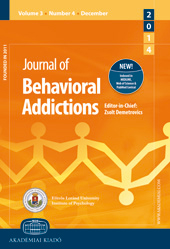Gender Differences in Treatment-Seeking British Pathological Gamblers
Gender Differences in Treatment-Seeking British Pathological Gamblers
Author(s): Silvia Ronzitti, Vittorio Lutri, Neil Smith, Massimo Clerici, Henrieta Bowden-JonesSubject(s): Gender Studies, Comparative Psychology, Clinical psychology, Behaviorism, Crowd Psychology: Mass phenomena and political interactions, Substance abuse and addiction
Published by: Akadémiai Kiadó
Keywords: gambling disorder; pathological gambling; treatment seeking; gender differences;
Summary/Abstract: Gambling is a widespread recreational activity in the UK. A significant percentage of gamblers develop subclinical or clinically relevant problem gambling issues, but only a low percentage of them seek treatment. Although characteristics of pathological gamblers from treatment-seeking population have been examined in some research, only a few studies have explored the differences between females and males. This study aimed to examine the gender-related differences in demographics, gambling measures, and clinical variables in an outpatient sample of pathological gamblers seeking treatment. Methods: A total of 1,178 treatment-seeking individuals with gambling disorder were assessed at the National Problem Gambling Clinic in London. Sociodemographic characteristics, clinical variables, and gambling behavior habits were obtained during the assessment evaluation. Of the total sample, 92.5% were males and 7.5% were females. Results: Males were more likely to be younger, white, and employed than females. In addition, compared to women, men showed a lower PGSI score, an earlier age of onset of gambling behavior, a higher gambling involvement, and preferred specific forms gambling. Female gamblers were more anxious and depressed, while men were more likely to use alcohol and illicit drugs. Conclusions: Our findings support the importance of gender differences in a treatment-seeking population of pathological gamblers both in sociodemographic characteristics, gambling behavior variables, and clinical variables. Males and females might benefit from group-specific treatment.
Journal: Journal of Behavioral Addictions
- Issue Year: 5/2016
- Issue No: 2
- Page Range: 231-238
- Page Count: 8
- Language: English

